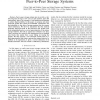Free Online Productivity Tools
i2Speak
i2Symbol
i2OCR
iTex2Img
iWeb2Print
iWeb2Shot
i2Type
iPdf2Split
iPdf2Merge
i2Bopomofo
i2Arabic
i2Style
i2Image
i2PDF
iLatex2Rtf
Sci2ools
128
Voted
P2P
2009
IEEE
2009
IEEE
Analysis of Failure Correlation Impact on Peer-to-Peer Storage Systems
Abstract—Peer-to-peer storage systems aim to provide a reliable long-term storage at low cost. In such systems, peers fail continuously, hence, the necessity of self-repairing mechanisms to achieve high durability. In this paper, we propose and study analytical models that assess the bandwidth consumption and the probability to lose data of storage systems that use erasure coded redundancy. We show by simulations that the classical stochastic approach found in the literature, that models each block independently, gives a correct approximation of the system average behavior, but fails to capture its variations over time. These variations are caused by the simultaneous loss of multiple data blocks that results from a peer failing (or leaving the system). We then propose a new stochastic model based on a fluid approximation that better captures the system behavior. In addition to its expectation, it gives a correct estimation of its standard deviation. This new model is validated by si...
Abstract—Peer-to-peer Storage Systems | P2P 2009 | Peer-to-Peer Computing | Reliable Long-term Storage | Storage Systems |
Related Content
| Added | 21 May 2010 |
| Updated | 21 May 2010 |
| Type | Conference |
| Year | 2009 |
| Where | P2P |
| Authors | Olivier Dalle, Frédéric Giroire, Julian Monteiro, Stephane Perennes |
Comments (0)

